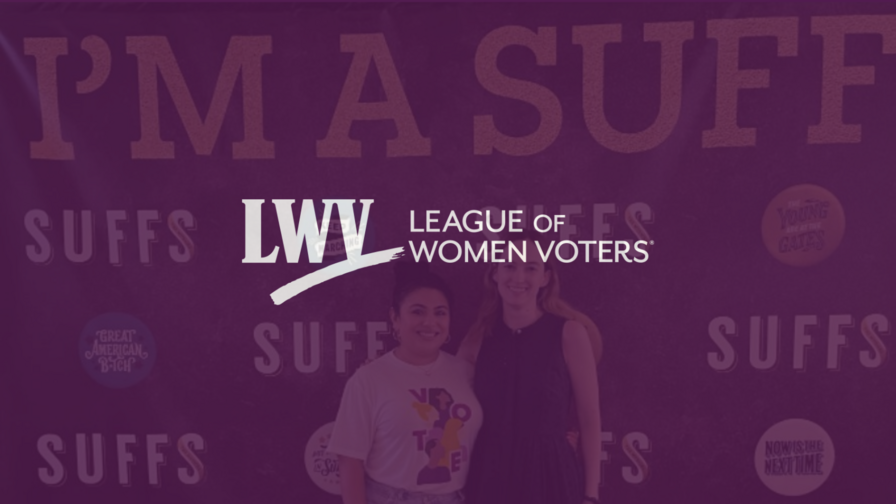Suffs and Women’s Activism, Past and Present
Updated 1/13/25
The Tony Award-winning musical Suffs depicts heroes of the suffrage movement — including LWV founder Carrie Chapman Catt — fighting for women’s right to vote in the early twentieth century.
During the show's Broadway run, it was a natural partner for the League, given our mutual advocacy for women’s rights and voter empowerment. In fact, on August 24, 2024 we partnered to put on a “League Night,” which included a post-performance panel featuring LWV’s CEO Celina Stewart and other election experts from the League, Suffs, and more.
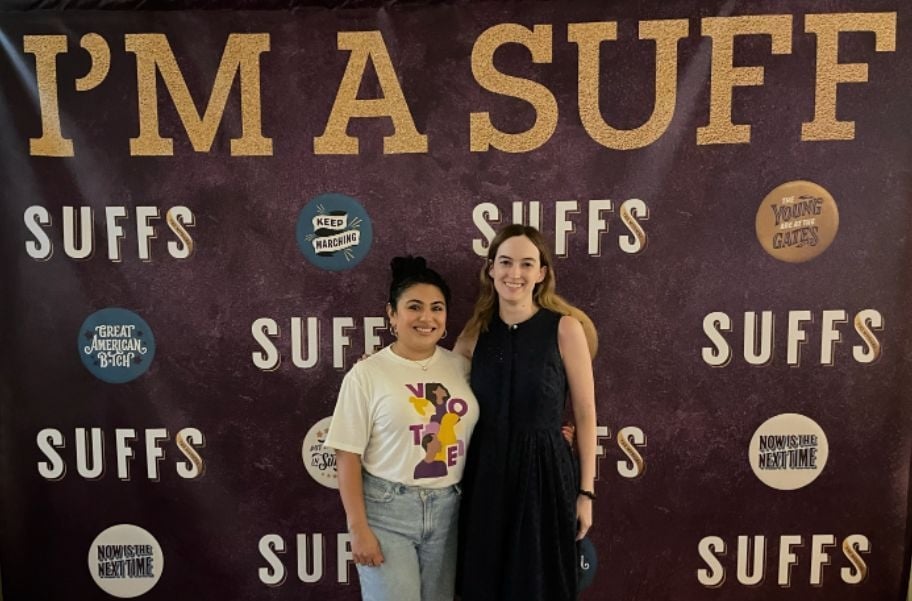
Earlier that summer, several League members visited the cast of Suffs to learn more about the show as it relates to both our century-plus history and women's activism today. Below are a few of our takeaways.
The Young Are at the Gates: The Power of the Next Generation
Suffs opens with two activists, former college friends Alice Paul and Lucy Burns, making space for young women within the established suffragist movement.
Paul sings about the desire to make change with fellow youthful activists, stating:
“I don't want to follow in old footsteps.
I want to march in the street...
I wanna shout it out loud in the wide-open light
Till our generation has made things right.”
The power of young activists is alive and well. Global data suggests that 70% of Gen Z-ers are involved in at least one social or political cause. And their youth is not a disadvantage, but a tool; much like Paul and Burns in Suffs, they’re adept at posing ideas that both challenge and invigorate longstanding movements.
Stay Updated
Keep up with news on young voters and more!
Within the voting rights space, Leagues have seen the power of the next generation. Young voters are estimated to make up nearly 1/5 of the American electorate, and they’re the most diverse voting bloc in American history.
We must foster an environment where the next generation of voters can “self-actualize, lead, and collaborate instead of simply falling in line.” At the League, we do this by hosting young voter registration drives and civic education workshops. You can also do so by supporting youth-led organizations or talking to the young people in your life about the world they’d like to see and how they’d like to get involved.
You never know which young person you meet may be our nation’s next Alice Paul or Lucy Burns. The more we empower them, the sooner we can bring about meaningful change.
Show Them Who You Are: Intersectionality in Activism
The simultaneous inspiration and friction that happen when people with diverse perspectives come together is another major theme in both Suffs and today’s advocacy spaces.
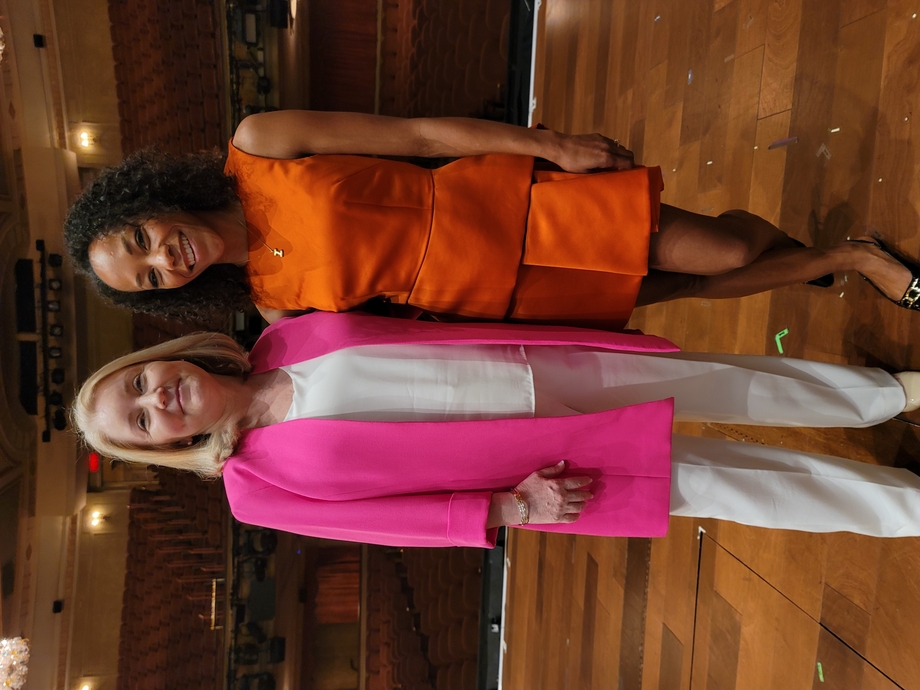
LWV President Dianna Wynn with Broadway cast member Nikki M. James, who played Ida B. Wells
Whether we’re young activists raising bold ideas in established organizations, like Paul does with the National American Women’s Suffrage Association, or women of color fighting for representation in historically white spaces, like Ida B. Wells and Mary Church Terrell in the suffragist movement at large, our identities influence our advocacy and give us unique and important perspectives.
We know that intersectionality makes us stronger — but that doesn’t make it easy. What’s easy is walking into a room where everyone has the same perspective and agrees about a movement’s goals and methods. Entering — and gaining victories — within a space where you’re forced to reckon with your own internalized biases and make room for opinions and experiences you don’t share can be incredibly difficult.
We see this in Suffs, when Paul and Champman Catt reference how generational conflicts can make them feel conversely like a “meek little one” and an “irrelevant, old fogey.” It’s easy to disregard one another’s opinions, partly out of the fear of having their own silenced.
We also see intersectional conflict illustrated by Wells and Terrell as they navigate their differing views on how to bring their identities as Black women into a historically racist movement.
Before a pro-suffrage march, they debate whether it’s helpful to participate in an event where many don’t even consider them welcome.
Wells: “Don’t you resent / that you’re a prop they trot out at events?”
Terrell: “If I didn’t speak
They wouldn’t even mention race.
I tolerate their system
‘Cause that’s the only way they’ll ever listen to our case.”
There is no easy way to lead an intersectional movement. But the alternative is a movement that not only disregards but oppresses entire communities. Is a pro-voter movement that doesn’t fight for Black voters really a pro-voter movement at all? What about a pro-democracy space that silences young voters or tosses out the experiences of previous generations?
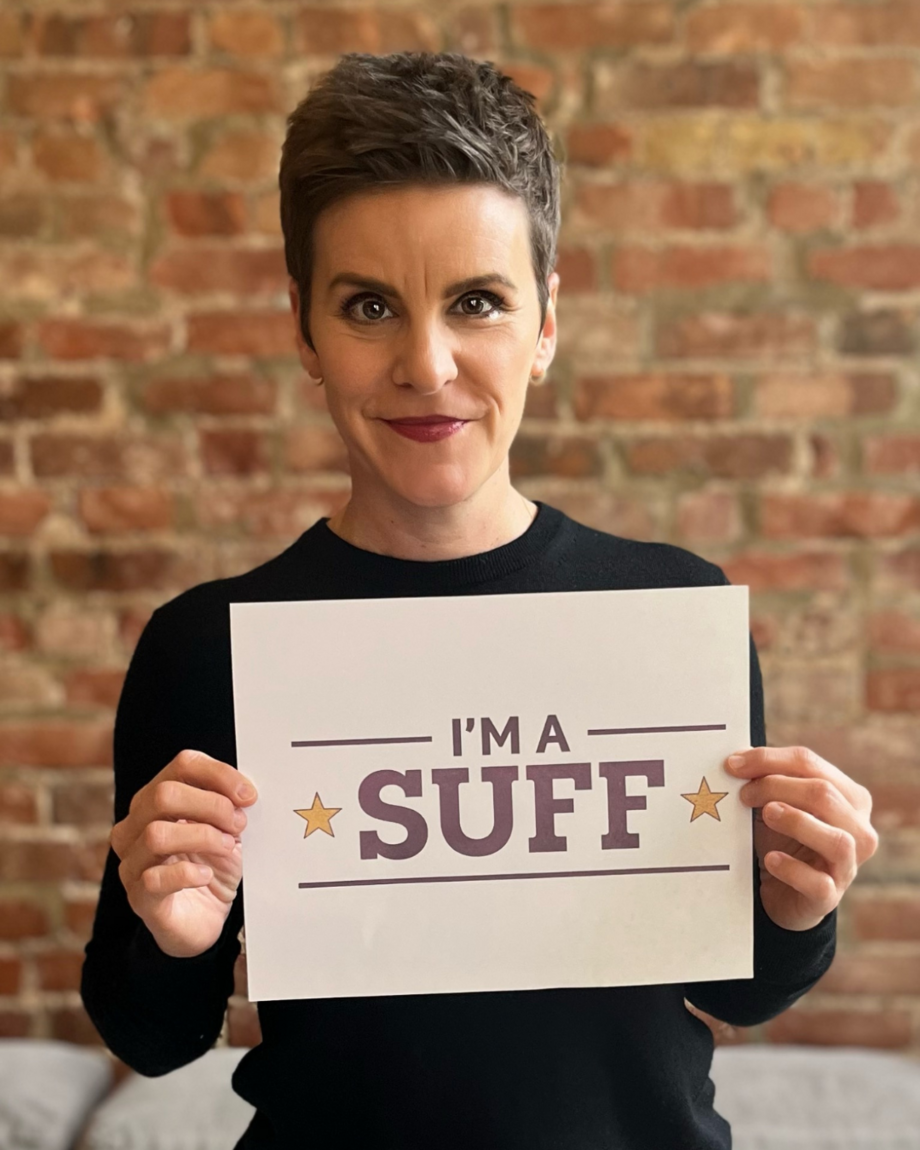
Jenn Colella, who played Carrie Chapman Catt in the Broadway cast of Suffs
Being truly representative and intersectional requires ongoing work. Neither during the 20th century nor to this day have the women’s and voting rights movements become completely anti-racist, anti-ageist, or free of any other “isms.” Yet meaningful progress has been made.
We see this reflected in the women of Suffs, particularly Chapman Catt and Paul. “[M]aybe she and I always needed each other,” Chapmann Catt muses of Paul. Her word choice is apt: we need one another — in spite and because of our differences.
How Long? Women Still Lack Equality Under the Constitution
In 1923, Paul and lawyer Crystal Eastman introduced the Equal Rights Amendment (ERA) into the Constitution. 101 years later, it still isn’t published.
Tell Your Reps to Support the ERA!
Paul proposes the ERA in the wake of the passage of the 19th amendment.
“Why stop at suffrage?
Why not push for complete legal equality?
We could call it something like the Equal Rights Amendment
Oh, the ERA for short, that will fit better on banners.”
When published, the ERA will update the Constitution to guarantee equality on the basis of sex. It’s a wildly popular amendment; as of 2020, 3 in 4 Americans supported it.
Yet the ERA is still not a part of the Constitution, despite having met all ratification requirements since 2020.
In 2023, the US House and Senate both introduced resolutions to address the ERA. It came to the Senate floor in April of that year, but despite support from a bipartisan majority, the resolution failed to meet the 60-vote threshold for a filibuster.
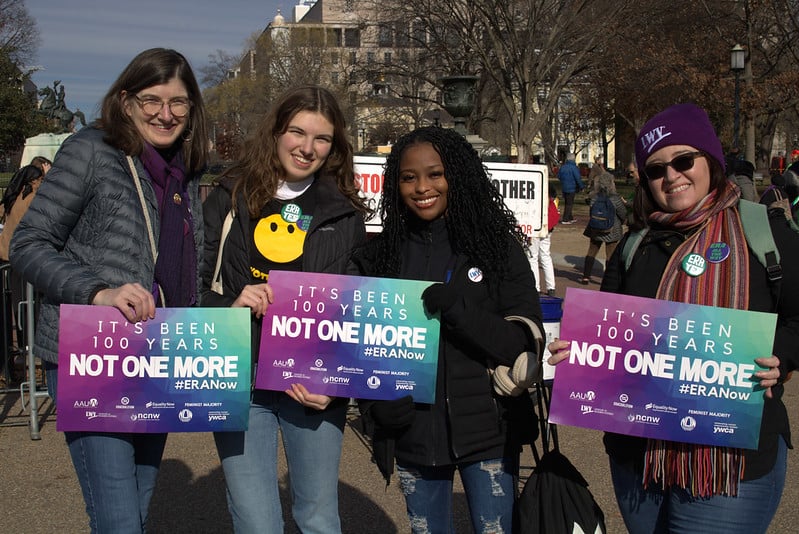
LWV continues to push our representatives to support these resolutions, and you can, too.
Alice Paul knew it, and we do, too: inequality hurts everyone. Let’s not let another century pass before making sex-based equality the law of the land!
Keep Marching: Change Depends on Us
Suffs leaves us with a final, crucial message:
“[Y]our ancestors are all the proof you need,
That progress is possible, not guaranteed.
It will only be made if we keep marching,
Keep marching on.”
The early suffragists prove that even when a cause feels hopeless, nation-shifting change is possible. But that change depends on the persistence of activists — often, diverse coalitions of women.
Whether its passage of the ERA, the restoration of our reproductive freedoms, or equal access to the ballot box, pro-democracy reform won’t happen without us. We must reach across generational divides, empowering young activists to revolutionize our spaces. We must work intersectionally, challenging our own biases and refusing to accept progress that excludes certain communities. And we must demand equality, both under the law and in our everyday lives.
There are many ways to “keep marching” in today’s movements. From youth groups to women’s and democracy rights organizations like the League, you can support ongoing work as a member or through donations.
You can also take a note from the team behind Suffs and explore advocacy through art, whether written, visual, or something completely new.
No matter how you get involved, we’re proud to stand besides you, shoulder to shoulder. Per Suffs:
“The future demands that we fight for it now.
It will only be ours if we keep marching.”
The Latest from the League
The ERA has a long history of champions who aimed to achieve “equality of rights under law” for people of all sexes in our Constitution. In honor of its 100th anniversary, we offer a look back at their work, how the ERA progressed, and where we are in the fight for equality.
You may consider yourself a history buff, but how well do you know the women who shaped our democracy? Test your knowledge and learn a thing or two with this quiz!
If we want to create a more inclusive democracy that represents the diverse needs of its people, we must empower young voters.
Learn why young voters are so important and how you can support them!
Sign Up For Email
Keep up with the League. Receive emails to your inbox!
Donate to support our work
to empower voters and defend democracy.





